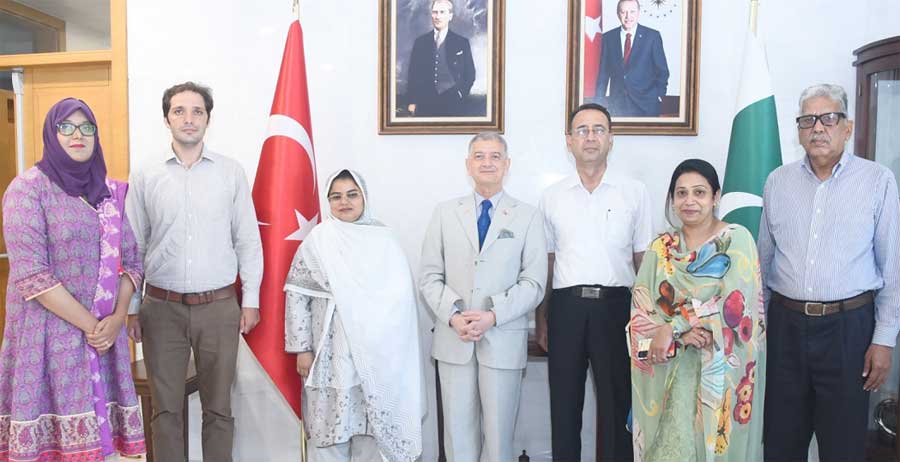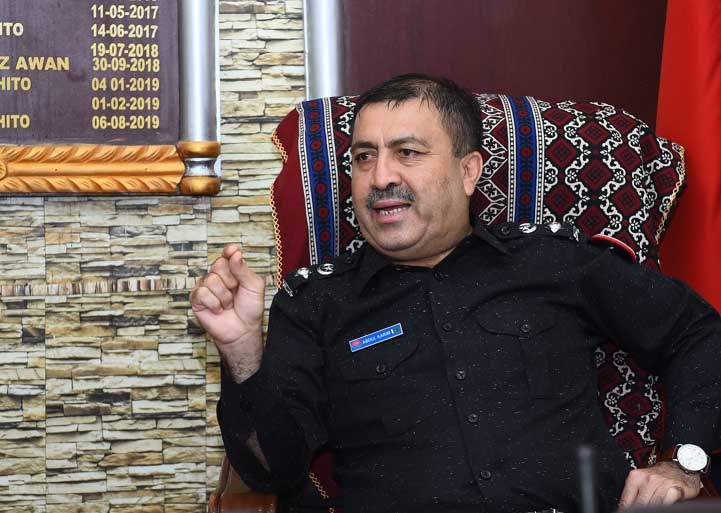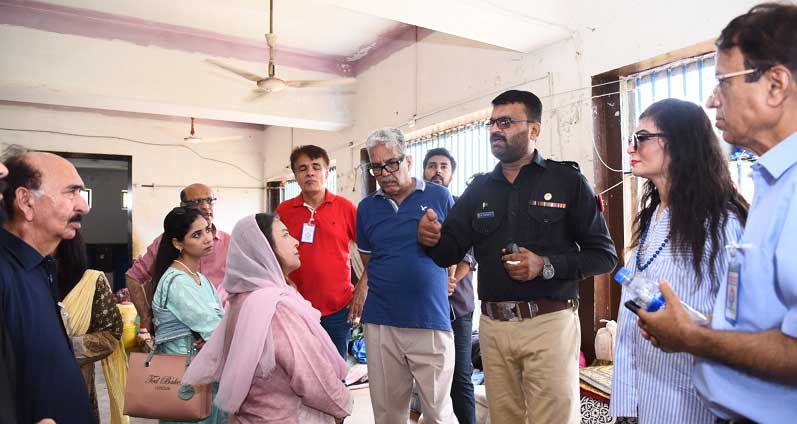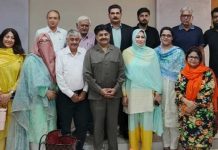Faculty of H&SS of the Bahria University visits Turkish Consulate

Faculty members from the Department of Humanities and Social Sciences (H&SS) at Bahria University Karachi, including the Secretary and a member of the Corporate Advisory Committee (CAC), visited the Turkish Consulate in Karachi during the reported week. They met with the Consul General of Turkiye, CemalSangu, who warmly welcomed the delegation with his ever-smiling and active demeanor.
The delegation was led by Dr. Sahar Afshan (Head of the Department of Humanities and Social Sciences) and included Urooj Aijaz (Secretary of CAC/Faculty), Qaiser Zaman (Faculty), Arif Khan (Faculty), Munizza Asad (Faculty), Manzar Naqvi (Member of CAC), and Noman Nizami (TFD).
During the meeting, the delegation proposed the initiation of Turkish language classes at the Department of Humanities and Social Sciences at Bahria University and requested the provision of a Turkish language teacher. The Consul General assured them of his full cooperation. Additionally, he briefed the delegation on the long-standing relations between Pakistan and Turkiye and the services provided by the Consulate in Karachi.
KEC members visit Central Jail Karachi

Senior members of the Karachi Editors Club visited Central Jail Karachi during the reported week and observed various facilities provided to prisoners. These included basic education, language courses, arts classes, music classes, education of the Quran and Sunnah, fine arts, and other programs promoting religious harmony and freedom for all sects, including Sunni, Shia, Christians, Hindus, and others.
Despite limited resources, the prison staff is dedicated, hardworking, and diligent in serving the prisoners. Although the jail has a capacity for two and a half thousand prisoners, they are working on the rehabilitation and training of over seven thousand prisoners. Jail Superintendent DIG Abdul Karim Abbasi shared these views while speaking to a delegation led by Karachi Editors Club President Mubasher Mir and Secretary General Manzar Naqvi during their visit to the Central Jail. Other club members were also present.
During this special conversation with journalists, DIG Abdul Karim Abbasi emphasized that when work is viewed as worship, it can be performed excellently as it pleases Allah and His Messenger. He stated that enduring pain and hardship becomes easier when one is committed to their work. He highlighted that their efforts are not individual but are supported by the cooperation of the IG, DIG, and staff, enabling them to fulfill their duties effectively.
Abbasi mentioned that support comes not only from the Sindh government but also from philanthropists and various organizations. He noted that this historic jail, built in 1899, originally had a capacity of only two to three thousand prisoners.
The administration and prisoners face challenges, but they have an excellent kitchen that provides appropriate meals twice a day, along with breakfast that includes eggs and other items, arranged by the provincial government.
He pointed out the strict discipline in the jail, where every prisoner is engaged in their respective work, whether in worship or other activities. Abbasi hoped the visitors were satisfied with the environment they observed.
Earlier, Deputy Superintendent Muhammad Yousuf gave a detailed tour of the jail to journalists, briefing them about each department. He showcased beautiful handicrafts, women’s shoes, and purses made by prisoners, along with valuable paintings and calligraphy created by prisoners Ijaz and Aziz. Journalists were also shown departments where prisoners learn various languages, including Chinese and Arabic, as well as modern computer education. The exemplary facilities provided to prisoners include basic education, language classes, fine arts, paintings, and religious education.
Muhammad Yousuf expressed the desire for prisoners to utilize their time productively so that upon release, they focus on better livelihoods instead of crime. He emphasized the crucial role of family, parents, and teachers in preventing crime and highlighted the importance of young people’s actions in influencing their siblings. Understanding right from wrong and the impact of one’s actions on the family is essential.
He hoped the visit would send a positive message to young people, stressing the need to eliminate envy as it harms society. Yousuf lamented the decline in elders discouraging wrongdoing and called for good upbringing to eradicate street crimes. He underscored the preciousness of human life and the duty to protect it, as the loss of one life can devastate an entire family. The government plans to build more jails in different cities to reduce the burden on Central Jail, making it easier for prisoners to meet their relatives. Welfare organizations are assisting, and Yousuf hoped the visitors found the environment satisfactory. The delegation noted that the calligraphy and paintings on the jail walls significantly improved the environment, and they enjoyed a beautifully managed music session by the prisoners.





